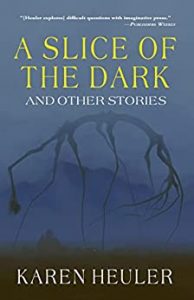Caren Gussoff Sumption Reviews A Slice of the Dark and Other Stories by Karen Heuler
 A Slice of the Dark and Other Stories, Karen Heuler (Fairwood Press 978-1-93384-622-4, $18.99, 206pp, tp), November 2022.
A Slice of the Dark and Other Stories, Karen Heuler (Fairwood Press 978-1-93384-622-4, $18.99, 206pp, tp), November 2022.
To say that Karen Heuler’s new collection, A Slice of the Dark and Other Stories, is deeply unsettling reveals only a tiny fraction: it is also musical, gorgeous, and uncomfortable. I wasn’t familiar with Hueler’s work before this, which feels like a huge miss on my part – and yours, if you haven’t delved into her catalog and are a fan of the New Weird; of work that tangles inscrutable nature and human foible, à la Jeff VanderMeer; and the magical matter-of-factness of Kelly Link. This oversight is easy to remedy, however, as this excellent collection contains both new and previously published stories, and gives a taste of her range and obsessions.
I’m loath to pigeonhole Heuler as a “women’s” writer, because gendering fiction is patently unfair and inaccurate. However, almost all the protagonists in these stories wrestle with issues most familiar to the female-identified, or with human issues viewed through a socialized-as-female lens. The exception is the first and titular story, “A Slice of the Dark”, in which a possibly enchanted piece of cake sets off a chain of events in which Harry, the main character, finds himself losing part of his vision and gaining the ability to find lost objects (mostly, honestly, considered literal garbage, such as cans and cigarette butts) which now, like him, have a special affinity for the night and the dark.
The rest of the stories follow a similar trajectory: we are in a familiar setting, such as a city, or, say, even a familiar post-apocalyptic Earth. But something – or some things – are strikingly different. Rats can speak, changeling children carved of wood are animate, a group of misfits try and reclaim the DNA of extinct giants by consuming soup enriched with their bones, and, in one especially chilling and emotionally familiar tale, an abusive boyfriend won’t die until he agrees to finally decide he is already dead.
It’s difficult to pick standouts. They’re all evenly done and thematically coherent (a feeling more than some set of actual concrete themes, which unfurls as you work through the collection). There were stories which held some sort of power over me after I read them, and curiously, were often not the stories I most enjoyed. “Teeth” is a great example of this; in this, a young woman suddenly develops a mouth overstuffed with enormous teeth. She looks monstrous, and thus, teeters over the edge towards actually becoming a monster. A chance encounter with Death, who asks her to become his companion, pushes her over the line into a monster, and then back to regret.
“Teeth” is, perhaps, one of the messiest stories in A Slice of the Dark. It’s over full and almost-purple in its prose (an ornateness not done in the other stories). It’s unhinged from the start, as opposed to the slight slow burn of other stories, in which you go from familiar to disoriented, and then to straight-up surreal. However, it conveys in a raw, emotional way the anger, resentment, and confusion lived by the female-identified, when they realize how much of their worth is dictated by appearance, or when that beauty fades. Again, I know this pressure is carried by folks of all genders, but “Teeth” applies a metaphor which aptly captures a rage born of Western advertising, marketing, gender socialization, and messaging. It’s ugly and scary – and it’s supposed to be.
“The Mechanical Nature of Love” is another story I didn’t enjoy, per se, but which held on to me after I set the collection down. It plays with the (now) trope of an event which eliminated all males from the population, leaving a world of women now reliant on developing androids to replace the entire gender. It calls out all the usual parts of the trope: men were destroyed because they were violent and abusive, and were ultimately defeated by an all-women uprising and a chromosomal plague which attacks only the Y in a pair. However, there’s a twist I won’t dare reveal, that sets the whole cliché on its ear. The twist is no “gotcha,” either. It’s a gentle reveal at the very end that is unexpected and fresh.
I did very much enjoy reading the most horror-flavored story in the bunch, “Unquiet Dreams”. Again, at its center is a monstrous woman, who, at first glance, only appears… odd. Quirky. Off enough that she takes a job as an assistant at a sleep clinic, where she tends to people who are, well, asleep, with only a gruff, almost-equally-odd male co-worker. However, of course, nothing is what it seems, and her true nature is revealed, reminding us that while the monstrous woman remains an unexpected anomaly in our cultural thinking, women can, of course, be predators as well as men can.
Overall, A Slice of the Dark was truly excellent. It does exactly what this sort of slipstreamy New Weird should do. It reminds us that even in the most mundane-seeming of people, places, and things, stuff is already bizarre and a bit sinister, if you only remember to really look at it.
Caren Gussoff Sumption is a writer, editor, Tarot reader, and reseller living outside Seattle, WA with her husband, the artist and data scientist, Chris Sumption, and their ridiculously spoiled cat-children.
Born in New York, she attended the University of Colorado, the School of the Art Institute of Chicago, Clarion West (as the Carl Brandon Society’s Octavia Butler scholar) and the Launchpad Astronomy Workshop. Caren is also a Hedgebrook alum (2010, 2016). She started writing fiction and teaching professionally in 2000, with the publication of her first novel, Homecoming.
Caren is a big, fat feminist killjoy of Jewish and Romany heritages. She loves serial commas, quadruple espressos, knitting, the new golden age of television, and over-analyzing things. Her turn offs include ear infections, black mold, and raisins in oatmeal cookies.
This review and more like it in the February 2023 issue of Locus.
 While you are here, please take a moment to support Locus with a one-time or recurring donation. We rely on reader donations to keep the magazine and site going, and would like to keep the site paywall free, but WE NEED YOUR FINANCIAL SUPPORT to continue quality coverage of the science fiction and fantasy field.
While you are here, please take a moment to support Locus with a one-time or recurring donation. We rely on reader donations to keep the magazine and site going, and would like to keep the site paywall free, but WE NEED YOUR FINANCIAL SUPPORT to continue quality coverage of the science fiction and fantasy field.
©Locus Magazine. Copyrighted material may not be republished without permission of LSFF.




